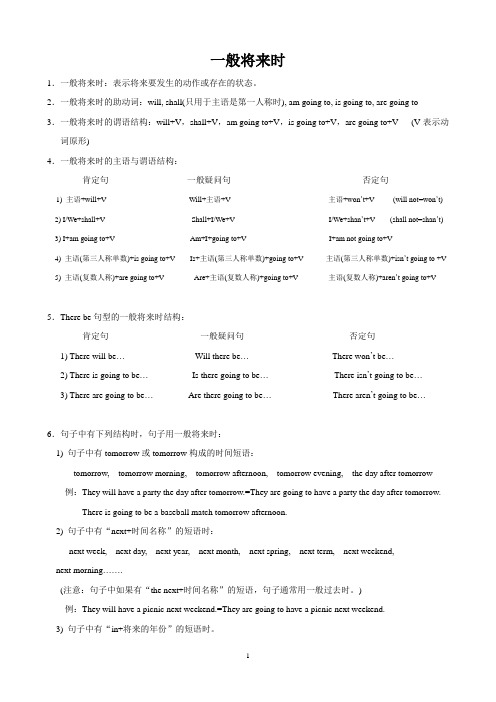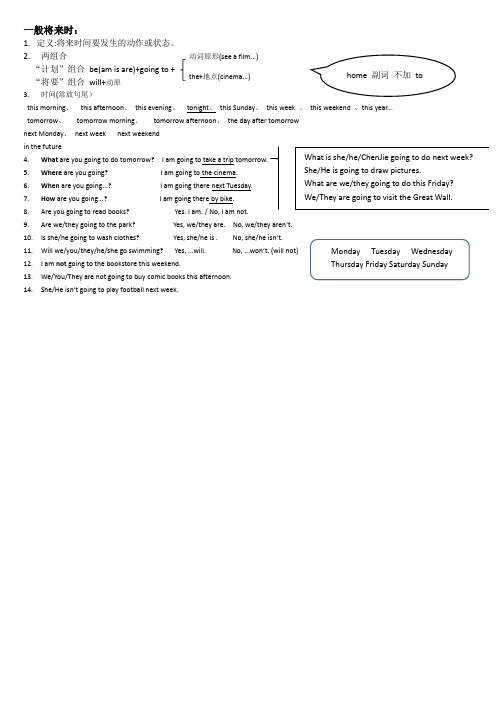一般将来时知识点总结
一般将来时知识点总结(word)1

一般将来时知识点总结(word)1一、一般将来时1.—I wonder if you for a picnic tomorrow.—If it ,I will go.A. go, not rainB. go, doesn't rainC. will go, isn't rain.D. will go, doesn't rain.【答案】 D【解析】【分析】句意:--我想知道明天你是否去野餐。
--如果天不下雨,我就去。
分析:第一个句子为宾语从句,主句为一般现在时,从句用原来的时态;第二个句子为条件状语从句,体现主将从现的原则,主语是第三人称单数,因此助动词用does.故选D【点评】考查动词的用法。
2.— Let's go fishing if it this weekend.— But nobody knows if it .A. is fine; will rainB. will be rain; rainsC. will be fine; will rainD. is fine; rains 【答案】 A【解析】【分析】句意:——如果这个周末晴天我们去钓鱼吧。
——但是没人知道是否会下雨。
第一个空前的if引导条件状语从句,意思是“如果”,从句中用一般现在时表示将来;第二个空前的if引导宾语从句,意思是“是否”,根据从句的tomorrow可知用一般将来时;故选A。
【点评】考查动词的时态。
3.—May I speak to Mr. Smith?—Sorry, he _______ Australia. But he _______ in two days.A. has been to; will come backB. has gone to; will be backC. has been in; would come backD. is leaving for; doesn't come back【答案】 B【解析】【分析】考查动词的时态。
一般将来时用法总结

一般将来时1.一般将来时:表示将来要发生的动作或存在的状态。
2.一般将来时的助动词:will, shall(只用于主语是第一人称时), am going to, is going to, are going to3.一般将来时的谓语结构:will+V,shall+V,am going to+V,is going to+V,are going to+V (V表示动词原形)4.一般将来时的主语与谓语结构:肯定句一般疑问句否定句1) 主语+will+V Will+主语+V 主语+won’t+V (will not=won’t)2) I/We+shall+V Shall+I/We+V I/We+shan’t+V (shall not=shan’t)3) I+am going to+V Am+I+going to+V I+am not going to+V4) 主语(第三人称单数)+is going to+V Is+主语(第三人称单数)+going to+V 主语(第三人称单数)+isn’t going to +V5) 主语(复数人称)+are going to+V Are+主语(复数人称)+going to+V 主语(复数人称)+aren’t going to+V5.There be句型的一般将来时结构:肯定句一般疑问句否定句1) There will be…Will there be…There won’t be…2) There is going to be…Is there going to be…There isn’t going to be…3) There are going to be…Are there going to be…There aren’t going to be…6.句子中有下列结构时,句子用一般将来时:1) 句子中有tomorrow或tomorrow构成的时间短语:tomorrow, tomorrow morning, tomorrow afternoon, tomorrow evening, the day after tomorrow 例:They will have a party the day after tomorrow.=They are going to have a party the day after tomorrow.There is going to be a baseball match tomorrow afternoon.2) 句子中有“next+时间名称”的短语时:next week, next day, next year, next month, next spring, next term, next weekend,next morning…….(注意:句子中如果有“the next+时间名称”的短语,句子通常用一般过去时。
一般将来时 知识点

一般将来时:1. 定义:将来时间要发生的动作或状态。
2. 两组合 “计划”组合 be(am is are)+going to + “将要”组合 will+动原3. 时间(常放句尾) this morning 、 this afternoon 、 this evening 、 tonight 、 this Sunday 、 this week 、 this weekend 、this year... tomorrow 、 tomorrow morning 、 tomorrow afternoon 、 the day after tomorrownext Monday 、 next week next weekendin the future4.What are you going to do tomorrow?I am going to take a trip tomorrow. 5.Where are you going?I am going to the cinema. 6.When are you going...? I am going there next Tuesday. 7.How are you going...? I am going there by bike. 8.Are you going to read books? Yes. I am. / No, I am not. 9. Are we/they going to the park? Yes, we/they are. No, we/they aren ’t. 10. Is she/he going to wash clothes? Yes, she/he is . No, she/he isn ’t.11. Will we/you/they/he/she go swimming? Yes, ...will. No, ...won ’t. (will not)12. I am not going to the bookstore this weekend.13. We/You/They are not going to buy comic books this afternoon.14. She/He isn ’t going to play football next week. 动词原形(see a film...)the+地点(cinema...)。
一般将来时知识点总结

【解析】【分析】句意:——我想知道他今天晚上是否加入我们吗?——我相信如果他完成了作业,他会加入我们的。根据句式结构第一句是if是否,引导宾语从句,根据tonight,可知从句是将来时态;第二句if如果,引导条件状语从句,时态为主将从现,此空用一般现在时,finishes,故选B。
【点评】此题考查从句时态。要根据不同的从句和不同的语境确定句子时态。
【点评】考查时态take an umbrella. The weather report says itin the afternoon.
— Thank you. I will put one in my bag.
A. will rain B. rains C. is raining
【答案】B
【解析】【分析】这是一道考查一般将来时以及as soon as结构使用的题目。
句意:你知道他明天什么时候来吗?不用担心,我认为他来了,他会给你打电话的。由tomorrow知第一句为一般将来时,故第一个空填will come形式;as soon as引导时间状语从句,主句用一般将来时,从句用一般现在时表一般将来时,故第二个空填comes。故选B。
一般将来时知识点总结
一、一般将来时
1.— Have you watched the new movie Jurassic World, Steven?
— Not yet. I ________ it with my cousin this evening.
A. will watch B. was watching C. watched D. have watched
【点评】考查动词的时态。
15.—I wonder if he ______ us tonight.
英语时态一般将来时知识清单总结及用法

英语时态一般将来时知识清单总结及用法1、一般将来时的结构2、一般将来时的结构变化3、知识要点一般将来时的用法(1) 表示将来的动作或状态,常与tomorrow,this evening. next Monday (week,month,year,in ten minutes,someday,in 2018,in the future 等单词或短语连用。
如:They say that the weather will be good tomorrow. 据说明天是好天气。
I shall have supper soon. 我要吃晚饭了。
There will be a class meeting this afternoon. 今天下午开班会。
He will come to see you next Monday . 他下周一会来看你。
(2) 表示即将发生的或最近打算进行的事,常用“be going to+动词原形”。
如:How are you going to spend your holiday ? 你们打算怎样度假?(3) 表示按计划即将发生的动作,常用go,come,start,move,leave等动词的进行时态。
如:He is coming in a minute . 他很快就来。
(4) 表示按计划要发生的事或征求对方意见,或表示安排、命令、预定好要做的事情,常用“be to+动词原形”。
如:The concert is to take place on Friday evening . 音乐会要在下星期五举行。
(5)表示即将发生的动作,或者表示立刻要做的事情,近在眼前的将来,常用“be about to+动词原形”。
如:Hurry up! The train is about to leave . 快点!火车马上要开了○(6) 一般将来时中be going to结构与will的异同点:①be going to结构和will的相同点:都表示将来的动作或状态。
高中英语一般将来时知识点总结

高中英语一般将来时知识点总结高中英语一般将来时知识11.1 一般将来时的构成肯定句:主语 + shall/will + 动词原形...否定句:主语 + shall/will + not + 动词原形...疑问句:Shall/Will + 主语 + 动词原形...?疑问代词/疑问副词 + shall/will + 主语 + 动词原形...?1.2 一般将来时的肯定句句型:主语 + shall/will + 动词原形....在书面语中,如果主语是第一人称,常用“助动词shall + 动词原形”构成一般将来时的肯定句,即“I/we + shall + 动词原形”;shall可缩写为'll:If I have time tomorrow,I think I'll get a haircut.如果我明天有时间,我想去理个发在口语中,所有的人称都可以用will,即“主语(所有人称) + will + 动词原形...”;will可缩写为'll:Some day,I'll tell you.将来某一天我会告诉你的。
1.3 一般将来时的否定句句型:主语 + will/shall + not + 动词原形...一般将来时的否定句是在will/shall后加not;will not可缩写为won't;shall not可缩写为shan't:Mary won't go to the party.玛丽不会去参加晚会。
1.4 一般将来时的一般疑问句句型:Shall/Will + 主语 + 动词原形...回答方式:Yes,主语 + shall/will.No,主语 + shall/will + not.一般将来时的一般疑问句是将助动词shall/will置于主语之前(大写shall/will的第一个字母),在句尾加问号;这种语序是主语和谓语倒装语序:Will he come? 他来吗?Will you be at our next meeting? 我们下次开会你来吗?Will you be free tonight? —Yes,I will./No,I won't(be free).今晚你有空吗? ——是,我有空。
一般将来时语法知识点
一般将来时语法知识点概念一般将来时表示将来某一时刻的动作或状态,或将来某一段时间内经常的动作或状态。
一般将来时由助动词shall(第一人称),will(第二、三人称)+动词原形构成。
美国英语则不管什么人称,一律用will。
用法讲解二、一般将来时的时间状语:tomorrow(明天)、the day after tomorrow(后天)、next...(下一...):next week(下一周)、next year(明年)、next month(下个月)in+一段时间(...之后):in three days(三天之后)、in an hour(一小时之后)in the future在未来、this evening(今天晚上)三、一般将来时的句型结构:1.will/shall+动词原型(will not=won’t)(will各种人称均可用,shall只能用于第一人称)1)肯定句:主语+will/shall+动词原型...如:I will go to school tomorrow.我明天将会去学校He will go to school tomorrow.他明天将会去学校。
2)否定句:主语+will/shall+not+动词原型...如:I won’t go to school tomorrow.我明天将不会去学校。
He won’t go to school tomorrow.他明天将不会去学校。
3)一般疑问句:Will/Shall+主语+动词原型...如:Will you go to school tomorrow?你明天要去学校吗?Will he go to school tomorrow?他明天要去学校吗?肯定回答:Yes,主语+will.如:Yes,I will.Yes,he will.否定回答:No,主语+will+not.如:No,I won’t.No,he won’t.4)特殊疑问句:特殊疑问词+will/shall+主语+动词原型... 如:What will you do tomorrow?你明天将会做什么?What will he do tomorrow?他明天将会做什么?2.be going to+动词原型1)肯定句:主语+be going to+动词原型...如:I am going to buy some books tomorrow.我明天打算去买一些书。
小升初英语一般将来时必考知识点
专题十五一般将来时一、一般将来时的用法将来某一时刻的动作或状态或将来某一时间内发生的事They will watch a film tomorrow.He is going to be a teacher in the future.I shall go shopping.★一般将来时的标志词tomorrow 明天next …下一个…in the future 将来later 以后the day after tomorrow 后天tonight 今晚this evening 今晚in ……以后二、一般将来时的构成1. I / We+shall+动词原形+其他eg. I shall buy a gift for my mother next month.下个月我将给我妈妈买一个礼物。
We shall have a party tonight. 我们今晚将要开聚会。
2. 主语+will+动词原形+其他eg. I will walk to the shop later. 我晚会将会走路去商店。
They will wash hands in two minutes. 他们两分钟之后将去洗手。
3. 主语+be going to+动词原形+其他eg. She is going to draw a picture in two hours. 她两小时之后将要画画。
I am going to play football next Friday. 我下周五要去踢足球。
三、一般将来时的基本句型结构①肯定句:I / We+shall+动词原形+其他. I shall take a bath.否定句:I / We+shall+动词原形+其他. I shall not take a bath.一般疑问句:Shall +I / we+动词原形+其他? Shall I take a bath?肯定回答:Yes, 主语+shall. Yes, I shall.否定回答:No,主语+shall not. No, I shall not.②肯定句:主语+will+动词原形+其他. She will sleep.否定句:主语+will not +动词原形+其他. She will not sleep.一般疑问句:Will+主语+动词原形+其他?Will she sleep?肯定回答:Yes, 主语+will. Yes, she will.否定回答:No, 主语+won’t. No, she won’t.will not= won’t③肯定句:主语+be going to +动词原形+其他. I am going to have dinner.否定句:主语+be not going to +动词原形+其他. I am not going to have dinner. 一般疑问句:Be+主语+going to+动词原形+其他?Are you going to have dinner? 肯定回答:Yes, 主语+be Yes, I am.否定回答:No, 主语+be not No, I’m not.四、句型转换做一般将来时的句型转换时,注意will和shall都是情态动词含有情态动词的句型转换做题步骤:①变否定句a. 找出情态动词注意:some变anyb. 情态动词后加not扩展:can not = can’t should not = shouldn’t②变一般疑问句a. 找出情态动词注意:一二人称互换b. 情态动词提前,其余照抄some变anyc. 句末加问号。
一般将来时与过去将来时知识点总结
一般将来时与过去将来时知识点总结一、一般将来时1.肯定句的结构为:主语 + will + 动词原形 + 其他成分例如:- I will go to the park tomorrow.(我明天将去公园。
)- They will have a meeting next week.(他们下周将开会。
)2.否定句的结构为:主语 + will not(won’t)+ 动词原形 + 其他成分例如:- We won’t be late for the concert.(我们不会迟到演唱会。
)3.疑问句的结构为:Will + 主语 + 动词原形 + 其他成分?例如:- Will you help me with my homework?(你会帮我做作业吗?)4.一般将来时还可以用于表示打算、意向、承诺、警告等。
例如:- We will visit our grandparents this weekend.(我们本周末会去看望祖父母。
)- He will work hard to pass the exam.(他会努力学习以通过考试。
)- I won’t accept the j ob offer.(我不会接受这个工作机会。
)5.当表示将来的时间或条件时,可以使用其他时间状语或条件从句来修饰。
例如:二、过去将来时过去将来时用于表示过去一些时间将要发生的动作或状态,一般由助动词"would"或"should"加上动词的原形构成。
1.肯定句的结构为:主语 + would / should + 动词原形 + 其他成分例如:- She said she would meet me at the airport yesterday.(她说她昨天会在机场接我。
)- They knew they should finish their homework before going out.(他们知道他们应该在出去之前完成作业。
一般将来时知识点
一般将来时一、知识梳理(一)基本用法1.概念一般将来时表示将来某一时刻的动作或状态,或将来某一段时间内经常的动作或状态。
2.构成基本构成句型例句am/is/are going todo肯定句I am going to go fishing next weekend.否定句I am not going to go fishing next weekend.一般疑问句Are you going to go fishing next weekend?特殊疑问句What are you going to do next weekend?will/shall do肯定句I shall/will visit my grandmother on Sunday.否定句I shall/will not(won’t)visit my grandmotheron Sunday.一般疑问句---Will you visit my grandmother on Sunday?---Yes,I will./No,I won’t.特殊疑问句What will you do on Sunday?3.常用时间状语明天下个XX后明天:tomorrow,后面可以加morning,afternoon,evening下个:next,后面可以加week,month,year等XX后:after和in,后面可以加three weeks/months/years这里要注意一下,after后加时间点才表示将来,如after3o’clock。
加时间段表示过去,如after2hours表示过去。
in后加时间段表将来,如in two years。
(二)考点1.will和shall的区别will可用于所有人称,但shall仅表示单纯将来时,用于第一人称I和we,作为will的一种替代形式。
以You and I为主语时通常避免用shall。
如:He will be back soon.他很快就会回来。
- 1、下载文档前请自行甄别文档内容的完整性,平台不提供额外的编辑、内容补充、找答案等附加服务。
- 2、"仅部分预览"的文档,不可在线预览部分如存在完整性等问题,可反馈申请退款(可完整预览的文档不适用该条件!)。
- 3、如文档侵犯您的权益,请联系客服反馈,我们会尽快为您处理(人工客服工作时间:9:00-18:30)。
一般将来时知识点总结 Company number:【WTUT-WT88Y-W8BBGB-BWYTT-19998】
一般将来时的用法
1)shall用于第一人称,常被will 所代替。
will 在陈述句中用于各人称,在争求意见时常用于第二人称。
Which paragraph shall I read first
Will you be at home at seven this evening
2)be going to +不定式,表示将来。
a. 主语的意图,即将做某事。
What are you going to do tomorrow
b. 计划,安排要发生的事。
The play is going to be produced next month.
c. 有迹象要发生的事
Look at the dark clouds, there is going to be a storm.
3)be +不定式表将来,按计划或正式安排将发生的事。
We are to discuss the report next Saturday.
4)be about to +不定式,意为马上做某事。
He is about to leave forBeijing.
注意:be about to 不能与tomorrow, next week 等表示明确将来时的时间状语连用。
不同表达法的区别
be going to和will
用于条件句时, be going to表将来,will表意愿。
If you are going to make a journey, you''d better get ready for it as soon as possible.
Now if you will take off your clothes, we will fit the new clothes on you in front of the mirror.
be to和be going to
be to 表示客观安排或受人指示而做某事。
be going to 表示主观的打算或计划。
I am to play football tomorrow afternoon. (客观安排)
I''m going to play football tomorrow afternoon. (主观安排)
一般现在时表将来
1)下列动词:come, go, arrive, leave, start, begin, return的一般现在时表将来。
主要用来表示在时间上已确定或安排好的事情。
The train leaves at six tomorrow morning.
2)倒装句,表示动作正在进行,如:
There goes the bell. = The bell is ringing.
3)在时间或条件状语从句中。
When Bill comes (不是will come), ask him to wait for me.
I''ll write to you as soon as I arrive there.
4)在动词hope, take care that, make sure that等后。
I hope they have a nice time next week.
Make sure that the windows are closed before you leave the room.
用现在进行时表示将来
意为:"意图"、"打算"、"安排"、常用于人。
常用词为 come, go, start, arrive, leave, stay等。
I''m leaving tomorrow.
Are you staying here till next week
常见考法
1.现在进行时表一般将来时;
2.无时间状语时一般将来时的确定;
3.一般将来时不同表达法的区别。
误区提醒
1.现在进行表将来的动词记忆不清;
2. 一般将来时态和其他时态一起用时的确定;
3.误用将来时态不同的表达方法。
【典型例题】
1. --- ____ leave at the end of this month.
--- I don’t think you should do that until ____ another job.
A. I’m going to; you’d found
B. I’m going to; you’ve found
C. I’ll; you’ll find
D. I’ll; you’d find
解析:错选C。
第二空在until 后,为时间状语从句,不能用将来时,故排除C和D。
A答案第二空处是过去完成时,根本不符合题意;正确答案为B。
此处leave意为“辞职”。
2. No one ____ this building without the permission of the police.
A. is leaving
B. is to leave
C. has left
D. will be leaving
解析:不明白be doing 和be to 的区别而错选A。
因为leave可以用现在进行表一般将来,表“某人打算离开”;但此处后面是“未经警方允许”,故不存在“打算”。
根据意思,正确答案为B。
